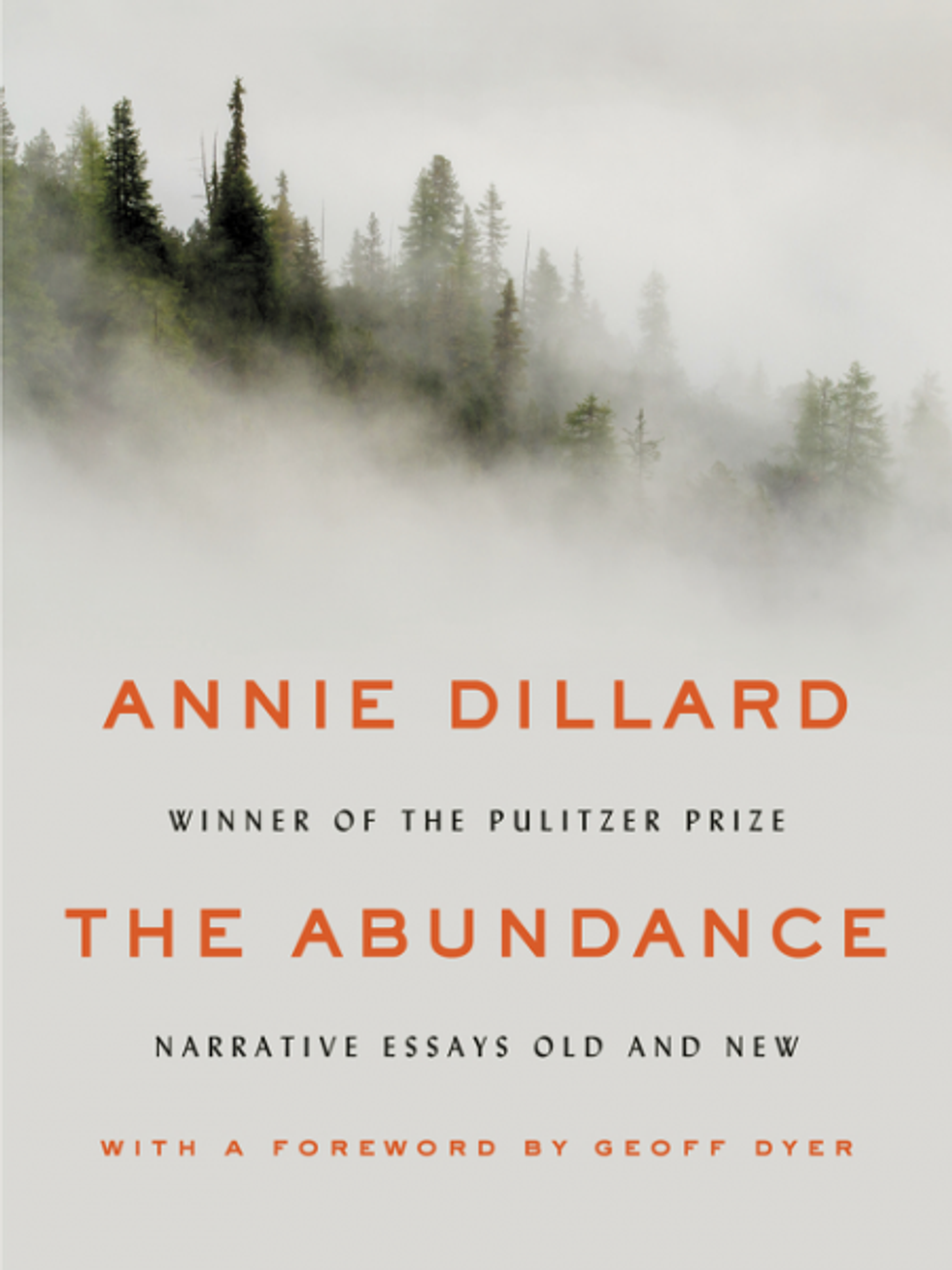I stepped into a bookstore by accident one day and came across "The Abundance" by Annie Dillard in the essay/poetry section by chance. It accidentally placed itself in my hands, I accidentally carried it to the checkout counter, and I accidentally paid for it and carried it home.
Finals Week was nearing and I had other assigned readings to do, but I couldn't bear the thought of waiting to begin this book. I simply had a good feeling about it. So I put off my other reading for a couple hours, I made myself at home between two overgrown shrubs on a campus bench that overlooks the city, and I opened the cover.
I don't think I could say much about Annie Dillard's writing that hasn't already been said. I'm embarrassed to admit that I'd never heard her name before coming across this essay collection. But I'm happy that I finally did. Her prose is electrifying. She dares to ask questions we don't have answers to. Her verb and noun choices are excellent and her use of repetition is smart. The images she constructs are fascinating and wonderful. I found myself laughing out loud often, sometimes because she has been humorous, and sometimes because she is extremely clever in unexpected ways. There is a spiritual element in her writing that makes it feel alive, and it's had a very lasting effect on me.
"Annie Dillard is one of the most fearless writers I have ever read because, like a prism filtering the greens and violets and golds of the spirit, she sees loss, suffering, ecstasy, grief, anger, betrayal, the meaning of life, the questions of life, the huge patterns of our cosmos, in every split and melting ice floe, in every tarantula that seizes a moth with its long and hairy legs. Like Blake, she possesses the ability to see a universe in a grain of sand or in a cracked kernel of corn... Annie Dillard picks a fight with the universe and means to win," said Terri Brown-Davidson in her 1993 Hollins Critic article "'Choosing the Given with a Fierce and Pointed Will': Annie Dillard and Risk-Taking in Contemporary Literature."
In "The Abundance's" foreword, Geoff Dyer writes, "A writer who never seems tired... Dillard can only be enjoyed by a wide-awake reader... She alerts us to the possibility of being free of formal conventions that constrain in the guise of enabling."
I was so moved by Annie Dillard that I felt the need to put together a small collection of quotes from several essays featured in "The Abundance." It was a painful process to pick and choose which to use; nearly every page in my book is marked, and I am thoroughly convinced that Annie Dillard does not write bad lines. This list is limited, and for the most part, I tried not to pull lines from beginnings, ends, or other crucial parts so as not to kill your curiosity before you can pick up a copy for yourself.
1. From "Total Eclipse"
"It was an abrupt black body out of nowhere; it was a flat disk; it was almost over the sun. That's when the screams began. All at once this disk of sky slid over the sun like a lid. The sky snapped over the sun like a lens cover. The hatch in the brain slammed."
2. From "The Deer at Providencia"
"Gentleman of the city, what surprises you? That there is suffering here, or that I know it?"
3. From "The Weasel"
"I think it would be well, and proper, and obedient, and pure, to grasp your one necessity and not let it go, to dangle from it limp wherever it takes you. Then even death, where you're going no matter how you live, cannot you part."
4. From "Tsunami"
"It's been a stunning time for us adults. It always is. Nothing is new, but it's fresh for every new crop of people. What's fresh is our grief. What is eternally fresh is our astonishment. What is eternally fresh is our question: What the Sam Hill is going on here?"
5. From "Seeing"
"I cannot cause light; the most I can do is try to put myself in the path of its beam... The secret of seeing is to set sail on solar wind. Hone and spread your spirit till you yourself are a sail, whetted, transluscent, broadside to the merest puff."
6. From "The Waters of Separation"
"Could it be that if I climbed the dome of heaven and scrabbled and clutched at the beautiful cloth till I loaded my fist with a wrinkle to pull, that the mask would up away to reveal a toothless old crone, eyes glazed with delight?"
7. From "An Expedition to the Pole"
"You do not have to sit outside in the dark. If, however, you want to look at the stars, you will find that darkness is necessary. But the stars themselves neither require nor demand it."





















